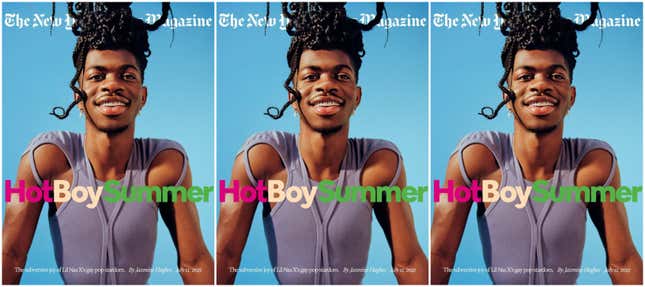
“Hot Boy Summer” officially has an ambassador—and it should come as little surprise that it’s Grammy-winner and professional provocateur Lil Nas X. The rapper and social media savant spent time with New York Times Magazine Staff Writer Jazmine Hughes for an extensive cover story that debuted on Thursday—and like the artist himself often does, it instantly trended on Twitter.
Perhaps it’s the elaborately braided Black Boy Joy Lil Nas X is exuding on the cover (courtesy of hair and makeup artist Widny E Bazile)—or the earnest and unapologetic grin he’s giving photographer Shikeith; but it’s clear that resistance is futile, y’all. As evidenced by the pulsating and provocative success of “Montero (Call Me By Your Name)”, this is Lil Nas X’s real coming out party—and we’re just guests.
This is the difference between the Nas of “Old Town Road” and the one heard now, both in musical approach and in self-depiction: The new one is really, really gay. Coming out, for Nas, was a recalibration. He wanted to be not just a pop star but a visibly gay one, a figure built on that Gen Z tendency to heighten a sexual identity into an exaggerated shtick, but one founded on a genuine pride and comfort...After years of hiding himself, there was now no mistaking it: He was trying to be, all at once, a hitmaker, a huge pop star, an out gay man and a sexual being.
Of course, As Hughes notes, this moment is bolstered by the 22-year-old’s enviable, almost Machiavellian mastery of social media, which began as a once-closeted but avid member of Nicki Minaj’s infamous Barbz squad. Becoming “internet famous” long before he was famous-famous, Lil Nas X harnessed the likes of Twitter and Reddit to bolster first his online profile, and later, his music. In the process, he reinvented himself into a star of his own making, even basing “Old Town Road” on “an emerging theme” of country trap he noticed online. Memorably, he made the song a hit before even inking a deal, as he “deluged the internet with memes attached to the song, hoping one would go viral.”
His breakthrough might be grounded in leveraging gimmicks and algorithms, but Lil Nas X contends his investment in music has always been very real. “I have this feeling like: You know what? This is mine. This is for me, and I commit myself to it,” he tells Hughes.
Now that he’s arrived—as an unabashedly out and proud artist—he’s not planning to go anywhere. In fact, the artist born Montero Lamar Hill placed “X” in his stage name to represent the Roman numeral 10, “to denote the number of years that he expected to elapse before he became a legend.” That was only three years ago.
Still, as Hughes aptly notes:
You’re nobody until you’re part of a conspiracy theory—and Nas, if you listen to some corners of the internet, is part of an evil, far-ranging effort to emasculate the Black man. In this he joins a lineage of many visibly queer Black men, from James Baldwin to Little Richard, whose sexuality has been seen as a siege on the purity of Black masculinity, already under so much duress. ...
There is a contemporary understanding of Black male identity that is condescending even as it intends to be caring: It posits that to be Black and a man is to be, exclusively, in constant danger. Attempts to complicate Black masculinity—like the once-constant rendering of Black men wearing flower crowns, as though this were a shocking juxtaposition—often seem built on those same stereotypes. Some people seem to enjoy defining what a Black man should or should not be.
In this way, the unrelenting fascination with Lil Nas X, one of only a handful of Black male artists who have dared to be openly queer—and currently the only one to revel in his sexuality at the same level as any of his hetero hot girl or boy peers—tells on itself. Perhaps some of us have been so starved for a full spectrum of what Black manhood can look like that we can’t turn away, even when we claim to be repulsed. And maybe that’s Lil Nas X’s real agenda—to call it (out) by its name.
You can read the full profile on Lil Nas X at New York Times Magazine.

